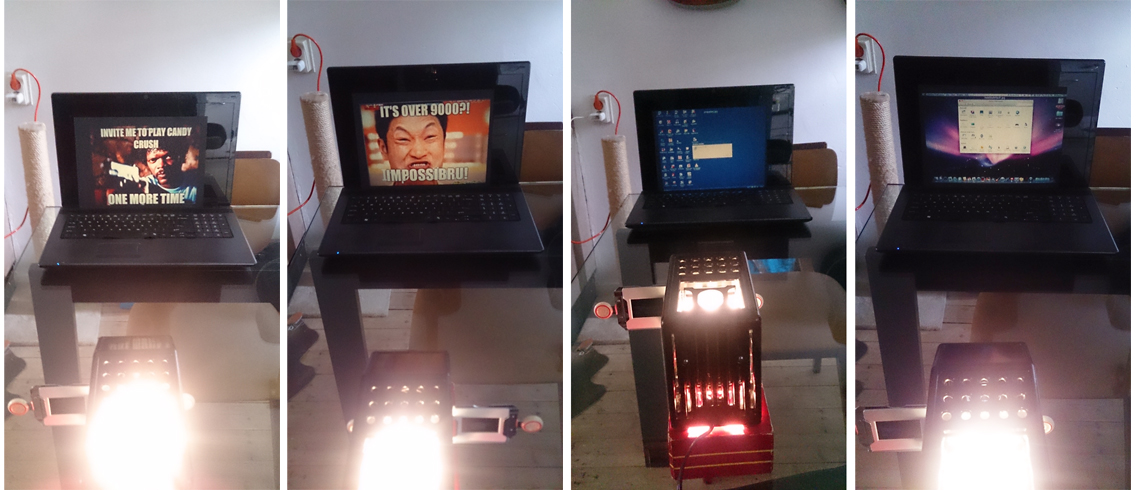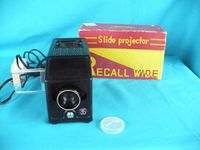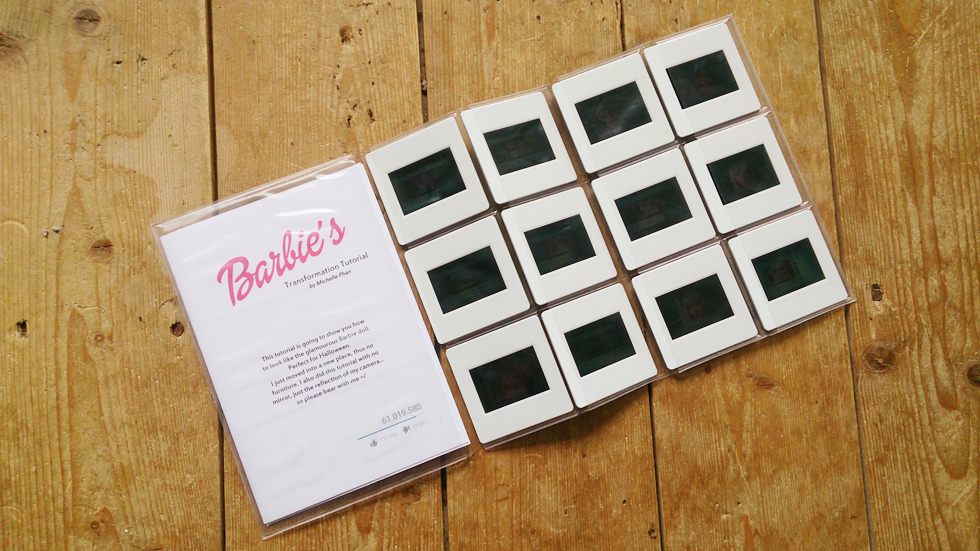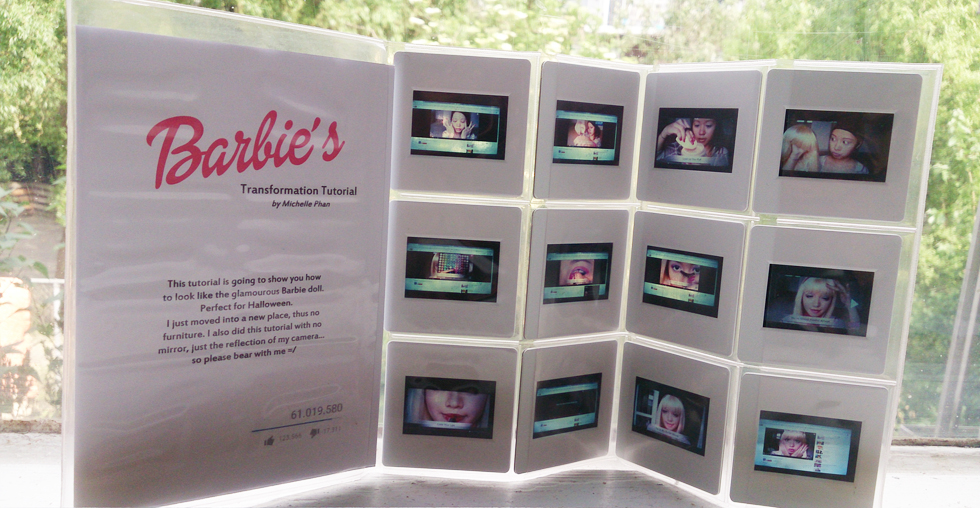Digital - Slides: Difference between revisions
No edit summary |
No edit summary |
||
| (12 intermediate revisions by the same user not shown) | |||
| Line 1: | Line 1: | ||
Turn digital images to analogue slides and present them with a slide projector. Images like memes and desktop screenshots, what happens to the images? What happens to their context? Are the just archived or is it a representation of the digital version? | |||
I bought a Slide-film and shoot with my analogue camera digital-images like a desktop, Facebook, Google, and internet Memes on a TV screen. After the development I projected them on a screen again like a Laptop or PC. So it looks like a physical image/photo becomes digital again. It's still an experiment but I like to continue with it, because the friction with digital images on a slide I find really interesting. | I bought a Slide-film and shoot with my analogue camera digital-images like a desktop, Facebook, Google, and internet Memes on a TV screen. After the development I projected them on a screen again like a Laptop or PC. So it looks like a physical image/photo becomes digital again. It's still an experiment but I like to continue with it, because the friction with digital images on a slide I find really interesting. | ||
[[File:Slide Projector Experiment.jpg| center]] | [[File:Slide Projector Experiment.jpg| center]] | ||
---- | |||
[[file:Recall_Wide_Slide_projector.jpg|200px|thumb|right]] | |||
The projector that I found for my experiment is a RECALL WIDE Slide Projector. The way it works and the action of putting slides (max. two) in the projector is an experience itself. Sliding to the next one is just great and has a nice feeling of looking at images. It becomes a performance when you are ‘''sliding''’. | |||
After my first ‘''homemade''’ slides I now know how it looks with digital-images as slides. And I was very happy that they worked. But what does this so called 'digital-slides' mean? What happens to some specific images when I transform them back to analogue slides? (The transition of analogue images, to a digital image, back to analogue) | |||
Questions: | |||
Where does it get interesting? What happens? What do you left behind for the viewer? | |||
The feeling for nostalgic, and seeing digital slides is already there, what is the extra layer? | |||
---- | |||
READINGS | |||
[[ Text: Jean Baudrillard - Why hasn’t everything already disappeared? ]] | |||
[[ Text: Jacques Derrida - Archive Fever ]] | |||
---- | |||
After reading from Baudrillard and Derrida, I believe the transition has more meaning than just making a photography. So how can I show this transition, rather that the images are a big distraction or have meaning to something. | |||
Like holiday photos, everyone has them, and the only meaning that they have are connected to the person how’s owns them. A personal connection. to the viewer not so important so may be a good way to highlight the transition of those images. If I take analogue holiday photos, make them digital by putting them on a computer and online platform, and photograph them analogue from a screen. The question might be ‘''is photography still death''?’, can I keep them alive by transform them back to analogue, to give them time. | |||
When I photograph my television with my chosen images, I already show some disappearing. The television is not on the slides, and the slides don't look like 'originals'. I create a black framework around the image. The transition is not clear enough if I just photograph them, and when you don't see the television. | |||
This item becomes too complicated, and I move it a side to experiment first. | |||
Some facts: | |||
* It's a type of photographic film that produces a positive image on a transparent base | |||
* Slides are one of a kind | |||
* Your slideshow is showing at a computer screen, the view of the slides is a part of the device projected on something, like a wall | |||
* You sit in the dark to view the slides | |||
* You have interaction with the device | |||
* If you touch the slides (like the two-slide-projector Recall) you have to think about mirrored or upside down of the images. | |||
---- | |||
EXPERIMENTS | |||
The most famous make-up video from Youtube is the ‘Barbie Transformation Tutorial’ from Michelle Phan. In her video she explains how to transform in to a Barbie by using make-up and accessories. This transition shows the digital video in to slides with a physical manual. The slides and the physical manual was an exact copy of the digital one, by using the screenshots and the text of the video. | |||
<center> | |||
[[file:Barbie_Tutorial_slides2.JPG]] | |||
[[file:Barbie_Tutorial_slides.jpg]] | |||
[[media:Guide Tutorial Barbie.pdf| Guide Barbie Tutorial]] | |||
</center> | |||
Latest revision as of 12:51, 11 September 2015
Turn digital images to analogue slides and present them with a slide projector. Images like memes and desktop screenshots, what happens to the images? What happens to their context? Are the just archived or is it a representation of the digital version?
I bought a Slide-film and shoot with my analogue camera digital-images like a desktop, Facebook, Google, and internet Memes on a TV screen. After the development I projected them on a screen again like a Laptop or PC. So it looks like a physical image/photo becomes digital again. It's still an experiment but I like to continue with it, because the friction with digital images on a slide I find really interesting.
The projector that I found for my experiment is a RECALL WIDE Slide Projector. The way it works and the action of putting slides (max. two) in the projector is an experience itself. Sliding to the next one is just great and has a nice feeling of looking at images. It becomes a performance when you are ‘sliding’.
After my first ‘homemade’ slides I now know how it looks with digital-images as slides. And I was very happy that they worked. But what does this so called 'digital-slides' mean? What happens to some specific images when I transform them back to analogue slides? (The transition of analogue images, to a digital image, back to analogue)
Questions:
Where does it get interesting? What happens? What do you left behind for the viewer?
The feeling for nostalgic, and seeing digital slides is already there, what is the extra layer?
READINGS
Text: Jean Baudrillard - Why hasn’t everything already disappeared?
Text: Jacques Derrida - Archive Fever
After reading from Baudrillard and Derrida, I believe the transition has more meaning than just making a photography. So how can I show this transition, rather that the images are a big distraction or have meaning to something.
Like holiday photos, everyone has them, and the only meaning that they have are connected to the person how’s owns them. A personal connection. to the viewer not so important so may be a good way to highlight the transition of those images. If I take analogue holiday photos, make them digital by putting them on a computer and online platform, and photograph them analogue from a screen. The question might be ‘is photography still death?’, can I keep them alive by transform them back to analogue, to give them time.
When I photograph my television with my chosen images, I already show some disappearing. The television is not on the slides, and the slides don't look like 'originals'. I create a black framework around the image. The transition is not clear enough if I just photograph them, and when you don't see the television.
This item becomes too complicated, and I move it a side to experiment first.
Some facts:
- It's a type of photographic film that produces a positive image on a transparent base
- Slides are one of a kind
- Your slideshow is showing at a computer screen, the view of the slides is a part of the device projected on something, like a wall
- You sit in the dark to view the slides
- You have interaction with the device
- If you touch the slides (like the two-slide-projector Recall) you have to think about mirrored or upside down of the images.
EXPERIMENTS
The most famous make-up video from Youtube is the ‘Barbie Transformation Tutorial’ from Michelle Phan. In her video she explains how to transform in to a Barbie by using make-up and accessories. This transition shows the digital video in to slides with a physical manual. The slides and the physical manual was an exact copy of the digital one, by using the screenshots and the text of the video.




